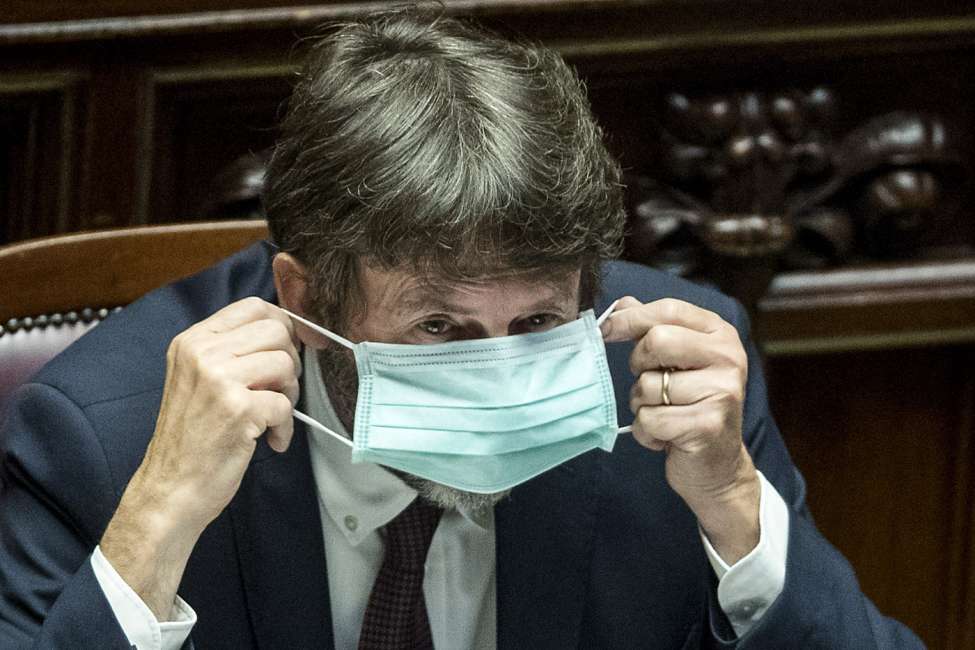Franceschini doesn't answer: here's the interview you won't read
For more than a month, we have been trying to obtain an interview with the minister of cultural heritage, Dario Franceschini, on the topic of culture during and after the health emergency. We submitted the request on April 14 and received several times assurances from the press office that the interview would be granted to us: however, it was never scheduled. Since we believe that the questions are urgent and closely related to the current events of the moment, we publish below the latest version of the interview, even without answers, in the hope that they may fuel a discussion on issues that we believe are of great importance.
 |
| Dario Franceschini |
1) Minister, museums, for the post-emergency (phase 2), are moving in short order. And several days after the May 18 reopening, there are still few (around 20 percent) cultural venues that have reopened. Why has the reopening been spotty? Did you have a plan for all museums, or was each one left to its own devices beyond the guidelines and health and medical prescriptions developed by the ministry?
2) It is presumable that we will not see crowds for a long time, partly because the containment measures will push many to avoid visiting a museum (no group tours, mandatory masks, mandatory distances-these are all deterrents, which affect the serenity of the public), and partly because so many are afraid to go out or to resume activities beyond what they consider strictly necessary. So there will need to be massive campaigns to regain the public’s attention and serenity. Do you already have a long-term strategy in mind to promote culture?
3) The forced closure of museums for two months has also caused significant economic damage, because we will lose about 40 million euros gross in ticket receipts alone. Now, a museum is not a business, which at the end of the crisis will be able to gradually increase productivity to recover turnover: a museum will not recover visitors. So there are two scenarios: either the state will have to increase investment in culture very substantially, or it will have to cut back. What should we expect? Have you already identified priorities to invest in, can we know if there is a strategy that can mitigate the damage that cultural institutions have suffered?
4) Speaking of resources, on 18app: in such a severe economic crisis, does it still make sense to allocate more than 100 million euros to a windfall gift for 18-year-olds? Wouldn’t it be more responsible, logical and judicious to reserve this amount for measures that can boost demand for culture in the coming months or years?
5) Let’s talk about museums as essential public services: the Covid-19 outbreak has shown us quite blatantly, I would say, the inconsistency between a decree that, in 2015, made museums essential public services, and a situation that imposes the impossibility of providing this essential service. Now, the “opening to the publbico of museums and other cultural institutions and places” is, of all the essential public services identified by law, the only one that has been discontinued, and I think we can agree that the provision of virtual content, moreover again without a single line, cannot be considered “opening to the public.” Don’t you find this very contradictory? That decree had been issued the day after a labor assembly at the Colosseum, with workers who had gathered because they had not received overtime payments for months: in light of the current situation, then, can we clarify the rationale for that measure?
6) The tourism world accuses you of not having a strategy. Now, we have seen you very active these days, from you came the call for a strong injection of liquidity at the European level and coordination action to manage the recovery. We agree on that, but on the practical side, beyond the contributions to the recovery decree, have you started to do anything yet? Then there is talk of promoting domestic tourism and grassroots tourism, but again this will need a substantial effort, especially in terms of promotion: how are we doing?
7) Still talking about tourism, it will be imperative to give in the eyes of the world, but also in the eyes of Italians intent on proximity tourism, the image of a safe country that knows how to move in unison. However, too many regional disparities still remain, nor does there seem to be any common coordination for the tourism supply chain. So, the situation being what it is, should we consider the summer season lost, or do we have a plan to attempt a recovery?
8) In an interview a few days ago, economist Carlo Cottarelli was asked why Italy did not invest more in culture, and his answer was “because we had other priorities,” and these priorities, according to Cottarelli, were the 80-euro bonus, quota 100, and citizenship income. In your opinion, minister, will this pandemic finally bring about a paradigm shift and make us realize, once and for all, that if we do not invest in culture and education we are a country doomed to failure?
Warning: the translation into English of the original Italian article was created using automatic tools. We undertake to review all articles, but we do not guarantee the total absence of inaccuracies in the translation due to the program. You can find the original by clicking on the ITA button. If you find any mistake,please contact us.





























